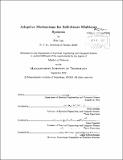| dc.contributor.advisor | Srini Devadas and Anant Agarwal. | en_US |
| dc.contributor.author | Lau, Eric (Eric Chi Young) | en_US |
| dc.contributor.other | Massachusetts Institute of Technology. Department of Electrical Engineering and Computer Science. | en_US |
| dc.date.accessioned | 2013-04-12T19:26:52Z | |
| dc.date.available | 2013-04-12T19:26:52Z | |
| dc.date.copyright | 2012 | en_US |
| dc.date.issued | 2012 | en_US |
| dc.identifier.uri | http://hdl.handle.net/1721.1/78466 | |
| dc.description | Thesis (S.M.)--Massachusetts Institute of Technology, Dept. of Electrical Engineering and Computer Science, 2012. | en_US |
| dc.description | Cataloged from PDF version of thesis. | en_US |
| dc.description | Includes bibliographical references (p. 90-92). | en_US |
| dc.description.abstract | As the push for extreme scale performance continues to make computer architectures increasingly complex, there has been a call for better programming models, and the systems to support them. Todays microprocessors now expose more system resources than ever to software, leaving it up to the application programmer to manage them. Studies have shown that the energy efficiency of future technologies may eventually affect the ultimate performance of multicore processors, and so programmers are forced to optimize systems for both performance and energy in the midst of countless configurable parameters - an extremely difficult task. Self-aware systems can configure themselves through introspection, providing performance and energy optimization without pressing an unrealistic burden on the programmer. However, to build effective self-aware systems, we must identify useful sources of adaptivity. This thesis will show the effectiveness of a number of adaptive mechanisms for self-aware multicore systems. We show that adding these mechanisms improves efficiency, and then make a case for coordinated adaptive systems. Coordinated systems treat adaptivity as a first-class object, and can outperform all non-adaptive, statically configured, and uncoordinated adaptive systems that do not possess a general view of system-wide adaptivity. | en_US |
| dc.description.statementofresponsibility | by Eric Lau. | en_US |
| dc.format.extent | 92 p. | en_US |
| dc.language.iso | eng | en_US |
| dc.publisher | Massachusetts Institute of Technology | en_US |
| dc.rights | M.I.T. theses are protected by
copyright. They may be viewed from this source for any purpose, but
reproduction or distribution in any format is prohibited without written
permission. See provided URL for inquiries about permission. | en_US |
| dc.rights.uri | http://dspace.mit.edu/handle/1721.1/7582 | en_US |
| dc.subject | Electrical Engineering and Computer Science. | en_US |
| dc.title | Adaptive mechanisms for self-aware multicore systems | en_US |
| dc.type | Thesis | en_US |
| dc.description.degree | S.M. | en_US |
| dc.contributor.department | Massachusetts Institute of Technology. Department of Electrical Engineering and Computer Science | |
| dc.identifier.oclc | 834088920 | en_US |
